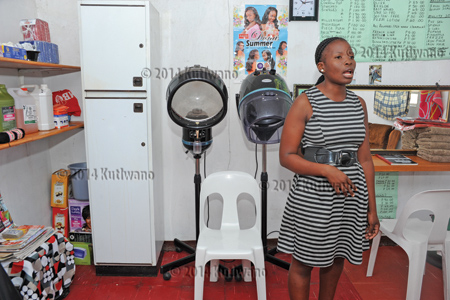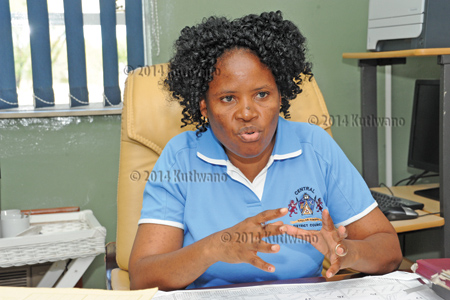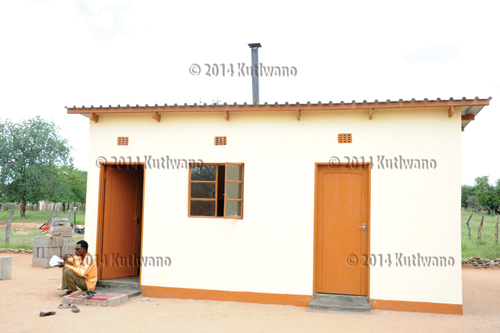Poverty Eradication Bobiwa on track
Source : Kutlwano
Author : Calviniah Kgautlhe
Location : Bobirwa
Event : Interview
Laughed to scorn as on a wild goose chase by some, government has remained resolute in its campaign to rid Batswana of poverty.
The campaign targets the whole country but gives priority to hard hit areas. Included in the list of hard hit areas are Bobirwa and Tuli.
Of the well over 15 000 Poverty Eradication Programme beneficiaries nationwide since its inception, over 1000 beneficiaries are from Bobirwa area, according to statistics from Bobirwa Sub District Council.
And like a dark veil poverty is gradually lifting off from beneficiaries in the area, says Bobirwa Sub-district assistant council secretary, Gomolemo Moepeng.
She says a budget of P4.5 million has been allocated to Bobirwa in this financial year and so far about 60 per cent of the budget (P2.7 million) has been disbursed on Poverty Eradication Projects in all of the 17 villages including the four rural settlements in the region.
Villages and settlements in the area include, Damochojenaa, Lepokole, Tobane, Motlhabaneng, Robelela, Molalatau, Tshokwe, Lentswelemoriti,Tsetsebjwe , Kobojango, Semolale, Mathathane, Bobonong , Sefhophe and others.
Moepeng expresses satisfaction at the programme uptake: “Beneficiaries have embraced the programme and we are doing quite well,” she says.
She says projects in the area are well on track as they have been able to roll them out to all concerned villages.
“We do this in such a way that we do not impose projects on people, because we realise their interest in a project is paramount, hence we allow them to choose what they want to do. Afterwards we impart necessary skills through training,” she says.
However, Moepeng says despite progress made in the region, they encounter challenges in administering the programme especially in the output.
The major problem faced by beneficiaries is that after establishing projects there is no market as the projects are based in areas where the majority of inhabitants are poor and unemployed.
She expounds: “They produce but there is no purchasing power which differs from village to village depending on employment levels, for example purchasing power in Lepokole rural settlement cannot be similar to Bobonong village because of various factors including location.
Projects are doing much better in Bobonong because there is more paid up workforce here.”
Moepeng says they started Poverty Eradication programme implementation in 2011 and Batswana have openly embraced the programme and are enrolling in good numbers.
She is doing a good job of coordinating the projects.
“So far no project has collapsed; we only have one project that is not functioning because the beneficiary has left it due to old age,” she says.
Furthermore, she says, “These projects have the challenge of competing against well established businesses, because of limited of resources; this is a serious challenge which can cause slow project growth.”
Her office is looking into the future and hopes to expand project base by tapping into the many dams currently under construction in the district. To this end plans are underway to introduce crop irrigation along the dams.
Matshediso Lebasa, from Damochojenaa is one of the programme`s beneficiaries. She has been operating her bakery for two weeks but is greatly worried people are not buying her bread – which we had the privilege of trying and can vouch for its great quality.
Each of the traditional scones that she sells – known as mapakiwa in local parlance, costs only P1.00.
“I cook and sell mapakiwa and sometimes I can make only P5.00 in day. The only time I make profit is when I supply schools and Ipelegeng beneficiaries. Otherwise there is little or no business.”
Lebasa says she also faces competition from other competitors who buy ready-made bread loaves from Selibe Phikwe and sell to villagers at a cheaper price, “when this happens I lose business,” she says. The story of Bobonong based Keneilwe Selema is more on the positive side. The programme helped her set up a salon business.
She started her business in 2011 and has since improved her place of operation and increased her clientele base.
“With the small profits that I made I was able to gradually improve my Salon business and included things that were not given to me to effectively run this business,” she says. He magic wand?
Nothing like that, she says. It simply “takes passion, determination and money management skills to make it. Ends
Teaser:
We do this in such a way that we do not impose projects on people, because we realise their interest in a project is paramount, hence we allow them to choose what they want to do.
















